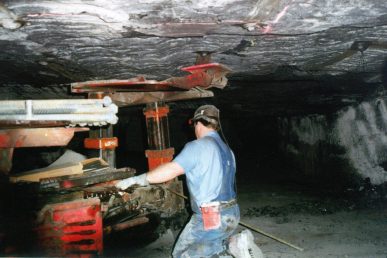UIC School of Public Health establishes Mining Education and Research Center
The University of Illinois at Chicago has launched a new center that will consolidate efforts to provide education and clinical services, along with conducting research related to health and safety in the mining industry.
The UIC Mining Education and Research (MinER) Center is based in the UIC School of Public Health and will be directed by Dr. Robert Cohen, clinical professor of environmental and occupational health sciences in the UIC School of Public Health.
“The center will bring together, under one umbrella, all the projects we are working on that have to do with health effects associated with work in the mining industry, including lung disease from mineral dust exposure and injuries,” Cohen said. “We also provide services through our federally funded Black Lung Clinic and Center of Excellence. Our extensive international education and outreach programs help educate miners and health professionals regarding risks of injury and illness in the mining industry.”
The UIC MinER Center will become the home of several coal mining research projects at UIC, including a $1.8 million, three-year grant from the Alpha Foundation for the Improvement of Mining Safety and Health, Inc., that will help determine why mine dust-related lung diseases, including progressive massive fibrosis and rapidly progressive pneumoconiosis, are on the rise. Other UIC studies funded by the Alpha Foundation will use big data sets to evaluate the course of black lung disease over a miner’s lifetime and look at malignant and non-malignant respiratory disease, as well as cardiovascular disease caused by mining activities.
Cohen and his colleagues both at UIC and at other institutions have led efforts around the globe that educate occupational, pulmonary and radiology physicians to better-recognize lung diseases caused by respirable dust produced in coal mines. Both silica and coal dust contribute to black lung disease — a progressive lung disease that Cohen and his team have found to be on the rise among coal workers.
“The mission of the UIC MinER Center is to help reduce the risk for mining-related health problems and treat and care for the mining workforce. These workers should not only exit the workplace safely at the end of each day but exit their careers in good health instead of being sickened by exposure to particulates that have damaged their lungs,” said Dr. Wayne Giles, dean of the UIC School of Public Health.
In Australia, Cohen and his group have been funded by the government of Queensland to train physicians to examine coal miners and identify coal mine dust-related lung disease on X-rays. Cohen’s team also discovered that lung disease is prevalent among coal workers there.
“Our discovery of black lung disease among Australian miners, which had been thought to have been eradicated, had a significant influence in the regulatory environment and helped change policies to be more protective of miners’ health,” Cohen said.
Cohen and his colleagues also manage extensive education and training programs in the Appalachian region of the United States and are currently working with colleagues to launch educational programs in Colombia, South America.
The UIC Black Lung Clinic will also be folded into the UIC MinER Center. The U.S. Department of Health and Human Services funds black lung clinics throughout the United States, including the UIC clinic, which is housed at Northwestern Medicine. The clinic sees coal miners from around the world.
UIC is also designated as the only Black Lung Center of Excellence, also funded by the U.S. Department of Health and Human Services. The center, which partners with colleagues at National Jewish Health in Denver, provides support for the black lung clinics nationally and training and research opportunities to clinicians and students interested in learning more about mining-related diseases. It was established in 2014 with funding from the Federal Office of Rural Health Policy.
Researchers and providers in the UIC MinER Center include Kirsten Almberg, Leonard Go, Kathleen Kennedy, Kim Leahy, Leena Thomas, and Dolores Weems.

